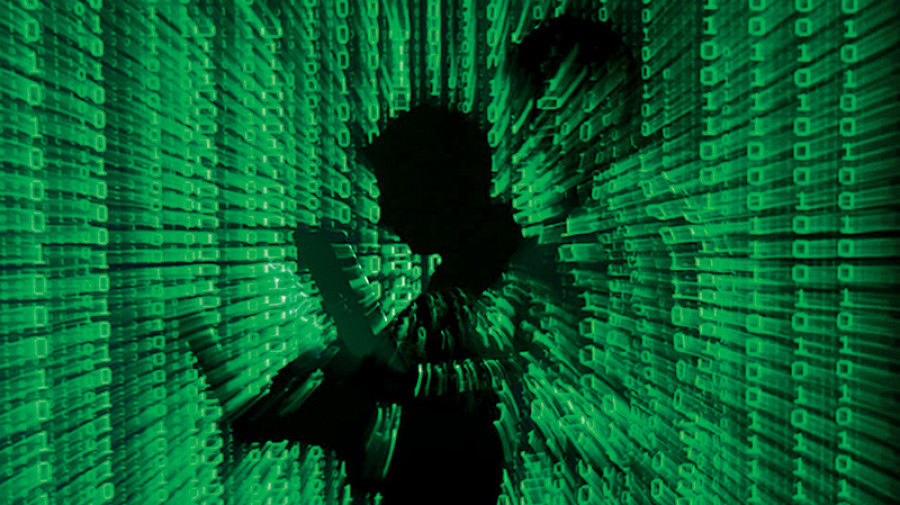Opinion
Rise of digital dystopia
Aided by vague laws, the police can arrest anybody for expressing an opinion online
A government official returns home and starts browsing Facebook with the objective of making full use of the internet connection he acquired to stay in touch with his family abroad and make cheaper calls. He has switched completely from TV to Facebook for news and entertainment. He scrolls his wall flooded with chaotic contents—memes, trolls, crazy baby pictures, health tips, manipulated photos of idols and all kinds of visual contents manufactured every minute and personalised according to his taste by flexible algorithms. Without hesitation, he ‘likes’ a few random posts and ‘shares’ a few pictures which he thinks are humorous without thinking about the possible consequences of his actions. One of the airbrushed pictures he has shared attracts the attention of the police who charge him with a crime he has never heard of.
Doctored image
On August 21, the police arrested Homnath Sigdel for sharing a doctored image of Prime Minister KP Oli claiming that it was against the government. While every imaginable manipulated picture of every other world leader appears on Facebook with thousands of shares and likes, only the digitally immature KP Oli’s picture got a digital citizen arrested in Kathmandu. Just a couple of weeks ago, the prime minister had made a symbolic move to switch from paper to digital Cabinet meetings, and photos of the ministers sitting in front of fancy MacBooks filled the media. But the government hasn’t realised that moving to digital is not just possessing a swanky device but also digesting the democratic debates it brings.
The government has arrested several citizens for expressing themselves on social media. Most of these cases were dealt with under the irrational Electronic Transaction Act (ETA) 2006. The purpose of the ETA is to regulate financial transactions and payments, and specifically ATM fraud, which was rampant at the time the law was drafted. The police have found the ETA a convenient excuse to arrest anyone for any case involving the internet.
According to the Nepal Police, 1,200 cases of cyber crime, most of them concerning social media, are currently under investigation. It is likely that all of them will be prosecuted under Section 47 of the ETA which doesn’t say anything about social media. This largely undermines freedom of speech online. The ETA cannot decide everything related to digital devices and environment, and it needs to be revised.
The controversial Section 47 of the ETA states, “If any person publishes or displays any material in the electronic media including computer, internet which are prohibited to publish or display by the prevailing law or which may be contrary to the public morality or decent behaviour or any types of materials which may spread hate or jealousy against anyone or which may jeopardise the harmonious relations subsisting among the peoples of various castes, tribes and communities shall be liable to the punishment with the fine not exceeding One Hundred Thousand Rupees or with the imprisonment not exceeding five years or with both.”
Aided by these vague words, the police can arrest any citizen who is expressing an opinion via any digital medium. The government has taken pains to show itself as being pro-digital with stunts like e-Cabinet, providing wi-fi access in public places or making the ministries digital-friendly. But merely equipping these places with devices is not going to solve the digital debate, rather it will boost the digital divide between lawmakers and citizens.
One has to consider that such facilities will encourage citizens to participate in more democratic discussions for which social media seems to be a widely accepted and accessible tool. Instead of only being concerned with what and what not to post online, the government and the police have to become ‘digital literate’ in order to participate and act in these digital endeavours. Now they are knowingly or unknowingly leaning towards ‘digital dictatorship’.
At the same time, the traditional media and social media cannot and should not be treated as the same. Hence, there has to be a revised or an independent policy for social media, as it is a platform known for more relaxed casual content and cosmopolitan language, which might not be liked by pre-digital lawmakers and police. Social media contents evolve regularly, and they cannot be confined with a closed policy. There should be an open policy which can be adjusted as required. For a country like Nepal, where Facebook is synonymous with the internet and many people use the internet just for Facebook, a social media policy is urgently needed.
The police should conduct a pre-investigation before arresting citizens and charging them with a criminal offence. The pre-investigation should look at the content and motive together, instead of just judging each issue independently and making assumptions about what the intent could be. This is very important because someone might not have shared a funny photoshopped image of a politician with vile intentions; they may have done so just for amusement and to get a few likes. The concept of freedom also increases with social media as people gradually digest the critics and pave the way for freedom of speech.
Discursive ecosystem
Social media is a discursive ecosystem and is conducive to hate speech, character assassination and smear campaigns. On the positive side, it also facilitates freedom of speech, activism and awareness. Because of its peculiarities and its affordances, social media is an influential tool which cannot be controlled even by its developers due to information dispersion. The other fact is the anonymity one can maintain to disseminate rumours and the vulnerability of fake information. However, Sigdel didn’t hide behind the curtain and use anonymity to utilise his freedom of expression. Hence, it is pointless to control it. Promoting digital literacy to create conscious digital citizens is the only way out for the government and lawmakers.
- Kharel is a researcher in new media and internet culture.




 11.5°C Kathmandu
11.5°C Kathmandu









